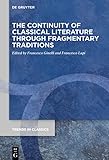The Continuity of Classical Literature Through Fragmentary Traditions / ed. by Francesco Ginelli, Francesco Lupi.
Material type: TextSeries: Trends in Classics - Supplementary Volumes ; 105Publisher: Berlin ; Boston : De Gruyter, [2021]Copyright date: ©2021Description: 1 online resource (XII, 216 p.)Content type:
TextSeries: Trends in Classics - Supplementary Volumes ; 105Publisher: Berlin ; Boston : De Gruyter, [2021]Copyright date: ©2021Description: 1 online resource (XII, 216 p.)Content type: - 9783110700374
- 9783110712292
- 9783110712223
- 880.09
- online - DeGruyter
- Issued also in print.
| Item type | Current library | Call number | URL | Status | Notes | Barcode | |
|---|---|---|---|---|---|---|---|
 eBook
eBook
|
Biblioteca "Angelicum" Pont. Univ. S.Tommaso d'Aquino Nuvola online | online - DeGruyter (Browse shelf(Opens below)) | Online access | Not for loan (Accesso limitato) | Accesso per gli utenti autorizzati / Access for authorized users | (dgr)9783110712223 |
Frontmatter -- Preface -- Contents -- List of Figures -- List of Tables -- Introduction -- Marginalia to Hesiodic Fragments -- To Belong or not to Belong -- ‘Well Begun is Half Done’? -- Collecting Fragments for a Fragmentary Literary Genre -- The New Nepos -- The Fifth Glossary of Nonius Marcellus -- Mythographus Homericus, Ἱστορίαι and Fragmentary Mythographers -- The Unruly Fragments -- List of Contributors -- Index of Names -- Index Locorum
restricted access online access with authorization star
http://purl.org/coar/access_right/c_16ec
Fragmentary texts play a central role in Classics. Their study poses a stimulating challenge to scholars and readers, while its methods and principles, far from being rigidly immutable, invite constant reflection on its methods, approaches, and goals. By focusing on some of the most relevant issues that fragmentologists have to face, this book contributes to the ongoing and lively debate on the study of fragmentary texts.This volume contains an extensive theoretical introduction on the study of textual fragments, followed by eight essays on a wide variety of topics relevant to the study of fragmentary texts across literary genres. The chapters range from archaic Greek epics (the Hesiodic corpus) to late-antique grammarian Nonius Marcellus as a source of fragments of Republican literature. All contributions share a nuanced, critical attention to the main methodological implications of the study of fragmentary texts and mutually contribute to highlighting the field’s common specificities and limitations, both in theory and in editorial practice.The book offers a representative spectrum of fragmentological issues, providing all readers with an interest in Classics with an up-to-date, methodologically aware approach to the field.
Issued also in print.
Mode of access: Internet via World Wide Web.
In English.
Description based on online resource; title from PDF title page (publisher's Web site, viewed 28. Feb 2023)


